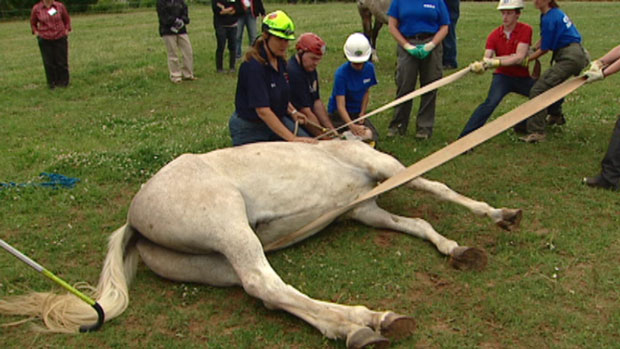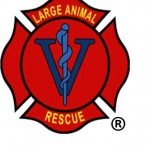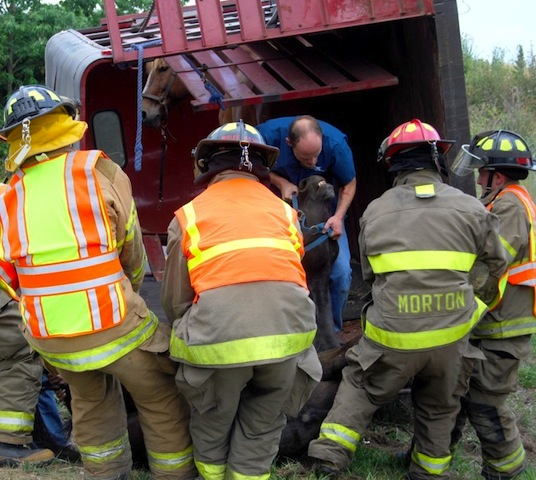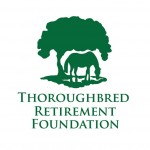After a spark from a hay bailer touched off a 200-acre grass fire that threatened the lives of 50 Ontario horses, volunteer firefighter and horseman Deborah Chute was galvanized to do more than train the fire hoses at the flames.
In a quest to help train horsemen and others in ways to help large, frightened animals, Chute organized an upcoming two-day symposium and training seminar in Ontario with a leading authority on caring for large animals during emergencies.
On July 20th and 21st, from 8 a.m. to 5 p.m., professional emergency response educator Rebecca Giminez, president and primary instructor of Technical Large Animal Emergency Rescue (TLAER) will offer classroom instruction and hands-on instruction in helping animals threatened by a range of emergencies, including fire and accidents, Chute says.
Morning sessions will be held at the Loretto, Ontario Station 2 on County Road 50, and afternoon sessions will take place at the nearby Kingsboro Farm at 1873 Concession 5: the purpose is to explain and to demonstrate what to do when catastrophe strikes, before 911 responders arrive.
“What really galvanized it for me was the 200-acre grass fire we had last year. It was just so dry and a field was alight in no time,” Chute says. “We had 50 horses that were threatened, and it was chaotic … and I really thought it was time for people to have the opportunity to train how to respond more efficiently, before help arrives.”
Having previously taken an emergency course herself, she promoted the idea of hosting something for the public—animal owners, veterinarians, anyone who might need to respond in an emergency involving animals. “I told him I found the course so useful, and that I learned so many practical skills that I thought if more people had this knowledge, it could be a real game changer in the event of an emergency.”
In rural Ontario horse country, it is not unheard of for horse trailers to overturn while transporting equines, or for car-on-horse accidents to occur, or even for an accident to occur on a hack in the country.
“People can get into trouble out on a trail ride. If the horse spooks and trips, they can end up at the bottom of a ravine,” she says. “And we see problems with ice in the wintertime, when people are out riding and they don’t realized they’re crossing a body of water until their horse falls through.”
While there is no panacea to prevent accidents or unpredictable weather spawning floods, tornados or hurricanes, there are safety precautions that can be made, and safer ways of handling terrified animals, she adds.
“By utilizing a published textbook, classroom demonstrations and lecture .. and videos of actual large-animal rescue incidents, (combined) with a hands-on practical exercise with live demonstration animals, TLAER, Inc. provides the necessary tools, techniques and protocols and tactics to students” to better address emergencies with large animals, according to TLAER’s literature.
Chute, who also owns and operates a horse retirement facility, says there’s a list of precautions owners can take to guard against the dreaded barn fire.
“Barn fires are so difficult. The barn itself is such a huge tinderbox. That’s why the owner needs to be prepared as much as possible,” she says. Recommended safety procedures include having and maintaining lightning rods and grounding cables; keeping the property’s street number visible and readable from the road— keeping brush and debris cleared from it; storing herbicides and other chemicals in a dry well-ventilated area away from the barn and livestock.
She also advises that all refueling of equipment be done outdoors and that all electrical work be done by a licensed electrician, and not a family friend or relative.
Chute hopes the course this month sparks an interest among other horsemen, in Canada and elsewhere, as word spreads that even when the worst happens, there are ways to prepare and help in the aftermath.
To register for the course, please click this link: http://mysubscription.ca/atfd/






I have another suggestion that would help to stop these terrible barn fires I have read about over the years. And that’s a overhead sprinkler system like you see in public buildings. Once that turns on it puts out the fire and keeps it from spreading. All stables need to be required to have one of these systems that would be sized to the building. These are needed especially at race track barns where so many horses are boarded part of the year.
Barbara, sprinklers sound like a great idea! I am not a proponent for more regulations, but I do wonder if new barn standards could build them in. Or, if they’re too costly to operate.I really don’t know, but my instinct is that it sounds like a great idea. 🙂
Susan, I just love all your good news content posted!! A cousin of mine (who lives on a farm near Orangeville) is one of the Captains at Mississauga Fire Dept. He told me about disaster, Firefighters have to face at barns. Awhile back, He quizzed my nephew (in school) on the chemicals used&how much of each, that go into a Fire Extinguisher. My own experiences at farms&racetracks as a TB owner, is that far too many people smoke carelessly. I personally, can’t stand that. Also, horse farms at risk from old or faulty wiring..rodent problems..water issues..Property owners are fined by municipal bylaw if they don’t have Emergency numbers up. Never mind insurance? Last year…Unfortunately, there was a fire at Openwood Farm in Caledon and 10 TB died. Thank you Rebecca and Deborah for your work!
Jo-Anne, thank you!!! I don’t get onto the comments often enough to thank readers. It would be wonderful if even a little awareness-building exercise could be built into the day-to-day operations at racetrack farms. It wouldn’t cost a dime to have personnel smoke in a designated area, away from the barns, I should think.
Ditto Maureta’s comment. It would be great if we could extend your training course to the US and host such classes. I’d be interested in helping with that effort! There was just such a barn fire in North GA that claimed the lives of 36 show horses. 🙁
This is an excellent idea! I would love to have a course like this in Central Ohio. As one who has been involved in emergency rescue situations, there is nothing more stressful than trying to get help for an injured animal. Thank you for sharing this information. I hope to initiate something like this in our own equine community.